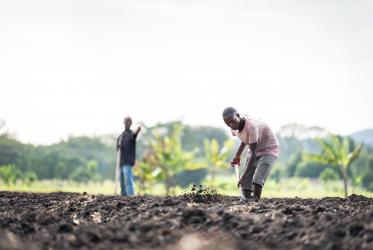Plenary on economic justice
Prof. Veronica Araújo coordinates the work of the Focolare Movement's Centre for Dialogue with Culture
The Economy of Communion project
Mr General Secretary, Dr Samuel Kobia,
Honourable Delegates from all over the world,
Allow me first of all to convey Chiara Lubich's greetings, the foundress of the Focolare Movement whom I am here to represent.
Since she could not be here as she so desired, she assures you of her prayers and best wishes for the success of this Assembly.
My task is that of briefly outlining the project referred to as the Economy of Communion, born within the sphere of the Focolare Movement from an inspiration that Chiara Lubich had while travelling here in Brazil in May 1991.
While staying at the small city of witness of the Focolare close to São Paulo, Chiara was directly exposed to the social-economic inequity of this immense nation. She was informed that numerous members of the Movement lived in the favelas of many Brazilian cities, immersed in poverty and want. The communion of goods that had been practiced among the members of the Movement since its inception was no longer enough to cover the basic needs of many of them.
After living days marked by a high spiritual climate and great brotherhood among people of different social backgrounds, she then had an inspiration: to give life to businesses, entrusting their management to competent people who would run them efficiently and render them profitable. Then - and herein lies the novelty - these profits would be divided into three parts: the first part for those in need; the second for the formation of new people, that is, people oriented to the culture of giving and inspired by it for their economic endeavours, because without such people, it is impossible to build a new society. And finally, the third part would be invested in the business, to strengthen and further develop it.
It was a simple idea, linear and very innovative because it introduces on the economic plane the principle of gift, of gratuity.
Today there are about 750 business that follow the principles of the Economy of Communion (EOC) worldwide. In responding to their primary mission to help the poor, every year they share their profits and thus alleviate many people's needs, providing employment for them, helping them rediscover the dignity that they had lost or never experienced.
This initiative is managed by a central commission that compiles the requests of needs and distributes the profits to those people, through the help of the directors of the Focolare Movement throughout the world. The people who receive them are also committed to living the culture of giving and mutual love.
This is a new way of giving: it is not a matter of philanthropy or social benefits, but of living in communion with the poor through the shared brotherhood experienced among the business members and those who are disadvantaged.
Then, in these 15 years, we have understood and experienced that the EOC project, in embracing the principles of the spirituality of unity of the Focolare as values to be lived out in concrete economic activity, is now developing its own method of business management. This practical experience has germinated guiding principles of a technical-ethical nature with which to orient business practice towards social co-responsibility, the mentality of giving.
These businesses, while operating in the current "for profit" market, function with a different logic than the traditional market model insofar as they follow a logic of sharing and communion.
Industrial parks have grown around the small cities of witness of the Movement as further developments of the EOC in these years. These parks give visibility to the project, bringing different firms together who have mutual love at the core of their business dealings, giving each other advice, supporting one another. Seven of these industrial parks have already been built, in several nations: three in Brazil; one, respectively, in Argentina, Belgium, Portugal, and Italy.
Chiara Lubich has received two honorary degrees in economics as a result of this project. Many scholars are beginning to deepen new ideas that emerge from these businesses, such as the concept of relational goods, trust, communion, and so on.
Many people are asking how businesses that are so attentive to anthropological and ethical issues can actually survive in our current market. I will let Chiara respond to that question: "In this type of business, one leaves room for God's intervention even in its concrete economic management. One then experiences that with each decision made counter-culturally to normal business practice, He never fails to send that hundredfold that Christ had promised: perhaps in the form of an unexpected revenue, a new window of opportunity, the support derived from new collaborations, an idea for a new product, and so on."1
This then, in brief, is the Economy of Communion Project which is raising considerable interest in the business sector and academic circles.
Thank you for your kind attention.
1C. LUBICH, The experience of the Economy of Communion: from spirituality a new proposal for business practice. Report given during the Conference organized by the Council of Europe in Strasbourg, titled "Market economy, democracy and solidarity: a space for comparison?"


